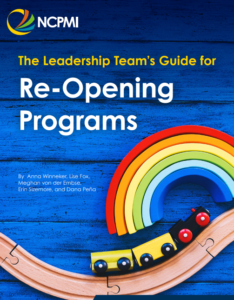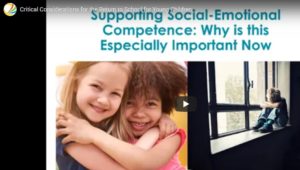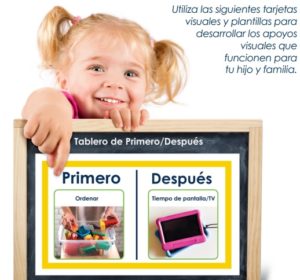 July 2021, Links updated September 2022
July 2021, Links updated September 2022
A special collection of resources from the
Early Childhood Centers funded by OSEP
- Resources to help communities reopen early childhood settings (Keep scrolling)
- OSEP’s funded Early Childhood Centers
- What about reopening of early intervention programs and services?
CPIR is pleased to host this collection of resources relevant to reopening early childhood programs and settings for young children with developmental delays and disabilities, ages 3-8.
The collection mindfully spotlights materials, videos, and webinars produced by the 5 early childhood centers funded by the Office of Special Education Programs (listed below) that early childhood programs can use to guide their reopening efforts. For practitioners, working in person again with families and their young children must seem like a welcome return to what’s familiar and known. However, much has changed, ourselves not least of all. COVID-19 has marked the ways we interact (or don’t), how we guard our health and our children’s, and the routines and expectations we have, just to name a few.
So it’s unsurprising that reopening early childhood programs and settings brings new challenges and opportunities to programs and families alike. We hope that the resources listed below will help early childhood practitioners and programs in welcoming families and children back into shared settings and experiences.
Resources to Help Communities Reopen Early Childhood Settings
__________________________
 The Leadership Team’s Guide for Re-opening Programs
The Leadership Team’s Guide for Re-opening Programs
From the National Center for Pyramid Model Innovations (NCPMI) | July 2020
13-page PDF, at: https://challengingbehavior.org/docs/Leadership_ReOpening_Guide.pdf
This document is designed to guide the Program Leadership Team around considerations for supporting children, families, and staff as they return to the early childhood program. The guidance includes social, emotional, and behavioral practices that teams know and encourages them to think about the systematic use of those practices to provide a safe and nurturing environment when children and their families return. The guide includes 29 hyperlinks to practical strategies and materials for practitioners and families in the return to school with an emphasis on helping children adjust, learn social-emotional skills, and prevent challenging behavior.
__________________________
Webinar | Critical Considerations for the Return to School for Young Children
National Center for Pyramid Model Innovations (NCPMI) | May 2021
Access the 1-hour webinar at:
https://challengingbehavior.org/webinar/critical-considerations-for-the-return-to-school-for-young-children/

NCPMI leaders Lise Fox and Mary Louise Hemmeter discuss what practices should be implemented to support children as they return to the classroom. The presenters identify:
-
- the priority social-emotional teaching practices for the preschool classroom,
- the use of Pyramid Model practices to support children entering kindergarten, and
- partnerships with families.
Back to top
________________
![]()
Back to School: Promoting Social-Emotional Skills and Preventing Challenging Behavior
9-minutes video | National Center for Pyramid Model Innovations (NCPMI) | March 2021
https://youtu.be/OodiEy8X0vQ?t=1
This brief video describes the strategies that might be used by early childhood programs, educators, and families to promote social and emotional skills and prevent challenging behavior. The video provides information on universal and targeted practices and materials useful upon reopening. This might also be re-posted by a Parent Center to inform families on the evidence-based practices that can be used as young children return to the early childhood classroom.
__________________________

Supporting Our Children with Online Learning
National Center for Pyramid Model Innovations (NCPMI) | November 2020 | 2-page PDF
https://challengingbehavior.org/docs/Supporting-Children-Online-Learning.pdf
Many early childhood educators and families of young children have been launched into the world of online learning in 2020. This brief articles offers just a few tips from parents for parents on how to support children and themselves during online learning experiences. Parent Centers might share this resource with families of young children who continue to receive online learning.
__________________________

Wearing Masks
(Available in Spanish, too | Usando máscaras)
National Center for Pyramid Model Innovations (NCPMI) | June 2020
15-page PDF | Parents might use this to help children prepare for the need to wear masks at preschool or within other environments.
English: https://challengingbehavior.org/docs/Wearing-Masks_Story.pdf
Spanish: https://challengingbehavior.org/docs/Wearing-Masks_Story_SP.pdf
This “scripted” story can help early childhood programs and families teach young children how (and why) to wear a mask. Scripted stories are read to children multiple times a day to prepare them for social expectations. This simple story is designed with captivating illustrations of young children ages 3-6 years.
Important note! According to the Centers for Disease Control and Prevention (CDC), children under 2 years of age should not wear masks. Any child wearing a mask should never be left unattended.
__________________________
 Visual Supports for Routines, Schedules, and Transitions
Visual Supports for Routines, Schedules, and Transitions
(Available in Spanish, too | Apoyos visuales para rutinas, horarios y transiciones)
National Center for Pyramid Model Innovations (NCPMI) | September 2020 | 9-page PDF
English: https://challengingbehavior.org/docs/Routine_cards_home.pdf
Spanish: https://challengingbehavior.org/docs/Routine_cards_home_SP.pdf
This guide shares information with families on how to use visual supports for building routines, following schedules, and making transitions easier for young children. The guide provides instructions and materials for developing visual schedules to use at home and for the transition to preschool. Families might also use this to help re-establish routines and schedules as children return to school.
__________________________

Transitioning Back to the Program: Connecting with Families
National Center for Pyramid Model Innovations (NCPMI) | June 2021 | 2-page PDF
https://challengingbehavior.org/docs/Transitioning-Back-Connecting-w-Families.pdf
As early childhood programs work on re-opening the program, staff can use the online communication and phone scripts in this guide to help them communicate and converse with their families.
__________________________
My Teachers Want to Know
(Available in Spanish, too | Mis maestros quieren saber)
National Center for Pyramid Model Innovations (NCPMI) | June 2021
1-page PDF | Early childhood programs can share this 1-page list of questions with families to learn more about each child’s and family’s needs.
English: https://challengingbehavior.org/docs/My-teacher-wants-to-know.pdf
Spanish: https://challengingbehavior.org/docs/My-teacher-wants-to-know_SP.pdf
Asking families to answer the 6 questions on this 1-pager can help early childhood practitioners understand more about the child and family’s needs as well as the child’s experience during his or her time away from the program (because of COVID-19 closures). Example question: “During the ‘stay at home’ time away from school, my child… (check all that apply)” with possible answers including options such as “missed seeing friends at school” or “had a difficult time with not being able to go places we usually go” or “was more anxious and nervous.”
__________________________
![]()
Supporting Our Youngest Learners: Addressing Trauma, Mental Health Concerns, and Social Emotional Wellness
9-minute video | National Center for Pyramid Model Innovations (NCPMI) | June 2021
https://www.youtube.com/watch?v=ATwKT4MZp48
This brief video describes the impact of COVID-19 and potential impact on children’s social emotional wellness. The video provides guidance on pivotal practices that can promote social emotional skill development and how programs can use a trauma -informed care approach.
__________________________

Checklist of Early Childhood Practices that Support Social Emotional Development and Trauma-Informed Care
National Center for Pyramid Model Innovations (NCPMI) | June 2021 | 5-page PDF
https://challengingbehavior.org/docs/Informed-Care-Checklist.pdf
Early childhood practitioners can use this checklist of practices to reflect on their individual current practices as well as to consider new practices they may want to adopt. Practitioners would choose two or three practices to implement in their class; even if they are already using some of these practices, they may choose to enhance and improve their practice by selecting new ones. Finally, each practitioner may develop additional new strategy/strategies for each category.
Example: Under the category of “Create a Safe Learning Environment using Positive Directions and Rules”
Practice | “Have space available for an individual child to be by him/herself when he/she needs a break”
Check options | “I Do This Consistently” or “I Want to Concentrate on this Practice”
__________________________
 Tips for Helping Your Child During the Pandemic
Tips for Helping Your Child During the Pandemic
(Available in Spanish, too | Consejos para ayudar a su hijo durante la pandemia)
National Center for Pyramid Model Innovations (NCPMI) | June 2021 | 2-page PDF
English: https://challengingbehavior.org/docs/Pandemic_helping-your-child_tipsheet.pdf
Spanish: https://challengingbehavior.org/docs/Pandemic_helping-your-child_tipsheet_SP.pdf
With the increasing prevalence of the coronavirus, parents might be feeling vulnerable, concerned, or anxious about the spread of the virus and the effects on their family. Their child might also be feeling this way in response to changes in a parent’s mood, information they are hearing, or changes in their daily routine or environment. The following suggestions and resources are designed to help parents support their child at this time.
__________________________
OSEP’s Funded Early Childhood Centers
OSEP funds multiple centers to assist and inform the nation about addressing the individual developmental and educational needs of infants, toddlers, children, and youth with disabilities. (CPIR is one of those centers.) Collectively, the funded programs are called the Technical Assistance and Dissemination (TA&D) network. To learn more about what projects are currently funded and what their prime focus area is, visit OSEP’s handy description, at: https://osepideasthatwork.org/sites/default/files/OSEP-Placemat-508_updated%20July%2017_2020.pdf
Centers Specializing in Early Childhood Matters
We mentioned that 5 centers were involved in creating this resource collection. All are funded by OSEP and were asked by OSEP to spotlight products that speak to the challenges of reopening early childhood settings and programs. Those centers are:
DaSy | The Center for IDEA Early Childhood Data System
The DaSy Center works with states to support IDEA early intervention and early childhood special education state programs in building high quality data systems and using data to improve results for young children with disabilities and their families.
Website: https://dasycenter.org/
ECPC | The Early Childhood Personnel Center
ECPC is funded to build awareness that an integrated, comprehensive system of personnel development (CSPD) for the early childhood (EC) workforce in every state will produce the most successful outcomes for children and families with disabilities.
Website: https://ecpcta.org/
ECTA | The Early Childhood Technical Assistance Center
The ECTA Center supports state Part C and Section 619 programs in developing high-quality early intervention and preschool special education service systems, increasing local implementation of evidence-based practices, and enhancing outcomes for young children with disabilities and their families.
Website: https://ectacenter.org/
NCPMI | The National Center for Pyramid Model Innovations
NCPMI assists states and programs in implementing the Pyramid Model for Supporting Social Emotional Competence in Infants and Young Children within early intervention and early education programs with a focus on promoting the social, emotional, and behavioral outcomes of young children birth to 5, reducing the use of inappropriate discipline practices, promoting family engagement, using data for decision-making, integrating early childhood and infant mental health consultation, and fostering inclusion.
Website: https://challengingbehavior.org
STEMIE | The STEM Innovation for Inclusion in Early Education Center
STEMIE is funded to build the knowledge base on learning opportunities in STEM (science, technology, engineering, and mathematics) for young children with disabilities (0-5). It also provides technical assistance and professional development to increase engagement for young children with disabilities in STEM opportunities,and engages partners and stakeholders from diverse disciplines to increase the inclusion of young children with disabilities in early high-quality STEM learning experiences.
Website: https://stemie.fpg.unc.edu/
Back to top
__________________________
What about Reopening of Early Intervention Programs and Services?
Throughout the pandemic, early intervention programs struggled to continue providing services to infants and toddlers with disabilities and their families. Because so many of those services are typically delivered in the homes of the children, their most natural environment, home visiting was often unavailable as an option. Nor was delivering services to babies and toddlers in person or in group settings. So it’s a quite reasonable question: What about reopening of early intervention programming as we once knew it?
 Answering that question is complicated, because each state runs its early intervention programming differently. COVID-19 protocols and vaccination rates also vary greatly state to state. So, if you’re looking to answer the question as it pertains to you, your young child, or your specific state, it’s best to seek out local or state groups that are informed and involved in such reopenings. Who or where to contact appears further below.
Answering that question is complicated, because each state runs its early intervention programming differently. COVID-19 protocols and vaccination rates also vary greatly state to state. So, if you’re looking to answer the question as it pertains to you, your young child, or your specific state, it’s best to seek out local or state groups that are informed and involved in such reopenings. Who or where to contact appears further below.
First, a word about early intervention in general | By law, under IDEA, every eligible child from birth to age 3 in the U.S. is entitled to receive support in reaching developmental milestones if they have a developmental delay or if they have a diagnosed condition that has a high probability of resulting in a delay. Early intervention (EI) services can have an enormous impact on a young child’s ability to learn and grow by supporting their family in assisting their child’s development and by strengthening physical, cognitive, communication, adaptive, and social-emotional skills.
To learn more about early intervention services, or to identify LOCAL service providers in your area | Please visit CPIR’s multi-part information suite, Babies and Toddlers, at: https://www.parentcenterhub.org/babies/
To find out what’s happening with early intervention services in your STATE | The two best sources of this information are:
- the lead agency for early intervention in your state (typically, the state health agency or the state department of education), which you can identify by visiting one of OSEP’s funded centers, the National Early Childhood TA Center (ECTA), at: https://ectacenter.org/contact/ptccoord.asp
- the Parent Center(s) serving your state or region, which you can identify on CPIR’s Find Your Parent Center page, at: https://www.parentcenterhub.org/find-your-center/

